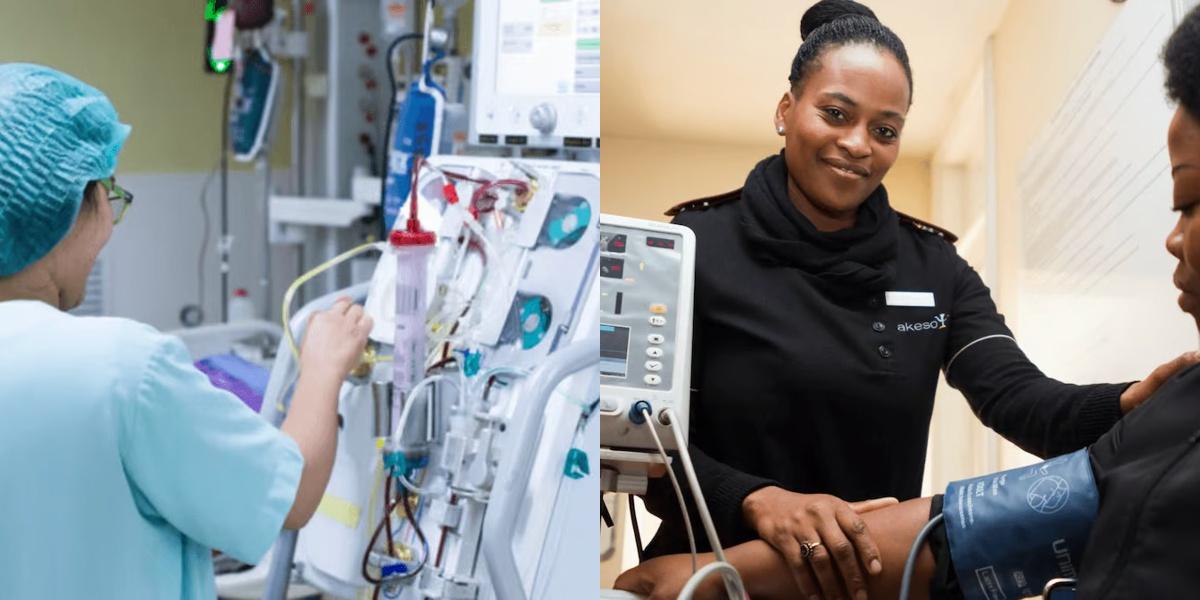Hemodialysis Technician vs Patient Care Technician (2024)

Healthcare is a rapidly growing field, with a wide range of career options to choose from. Hemodialysis Technicians and Patient Care Technicians are both important roles that contribute to the care and well-being of patients. Understanding the differences between these two professions can help you determine which one aligns best with your interests and goals.
Key Points:
- Hemodialysis Technicians operate dialysis machines and monitor patients' vital signs; Patient Care Technicians provide basic nursing care and assist patients with daily activities.
- Hemodialysis Technicians typically earn higher salaries than Patient Care Technicians.
- Both roles are in high demand for the next decade. Jobs for dialysis technicians are projected to grow by 5% while PCTs have a 4% increase in job outlook!
- Hemodialysis Technicians require formal training and certification, while Patient Care Technicians may have the option of online or in-person training programs.
- Hemodialysis Technician training programs are generally more expensive and take longer (6-12 months) compared to Patient Care Technician programs (4-6 months).
What does a patient care technician do on a resume?
If you're a patient care technician and you want to elevate your resume, here are some of the responsibilities you should highlight on your resume - assisting patients with daily activities, taking vital signs, testing glucose levels, drawing blood, administering and removing IVs or catheters, and delivering patient care plans.
What is the day in the life of a patient care technician?
A patient care technician can have different tasks depending on where they work but most of their everyday tasks involve helping patients with personal hygiene, serving meals, checking vital signs, setting up medical equipment, and communicating patient concerns to nurses or doctors.
What is the top pay for dialysis technician?
According to the U.S. Bureau of Labor Statistics as of May 2023, the highest 10% of clinical laboratory technologists and technicians, which includes dialysis technicians, earn more than $93,900 per year!
What is the skill of a dialysis technician?
A dialysis technician should be skillful in the areas of patient care, operation of dialysis machines, monitoring patient responses to treatment, and maintaining patient records.
Is dialysis a stressful job?
Stress can be subjective and every individual has varying tolerance. However, a dialysis technician can be subjected to stressful situations due to the critical nature of dialysis treatment and the need for meticulous attention to detail.
Final Thoughts
Choosing a career in healthcare is an important decision that requires careful consideration. Both Hemodialysis Technicians and Patient Care Technicians play vital roles in providing care to patients, but they have distinct differences in terms of focus, setting, and scope of practice.
If you have a specific interest in working with patients with kidney disease and operating dialysis machines, becoming a Hemodialysis Technician may be the right path for you. On the other hand, if you enjoy providing care to a wide range of patients and assisting with various medical procedures, pursuing a career as a Patient Care Technician may be a better fit.
Consider your interests, goals, and the educational requirements for each profession when making your decision. Additionally, it's always a good idea to research job opportunities and speak with professionals in the field to gain further insight into the day-to-day responsibilities and future prospects of each career path.
No matter which path you choose, a career in healthcare can be rewarding and fulfilling, as you have the opportunity to make a positive impact on the lives of others.
Dreambound's programs cater to diverse locations. Take advantage of the wealth of information in these blogs for a thorough exploration of the two vocations, including detailed insights into their requirements and practical advice on getting started:





